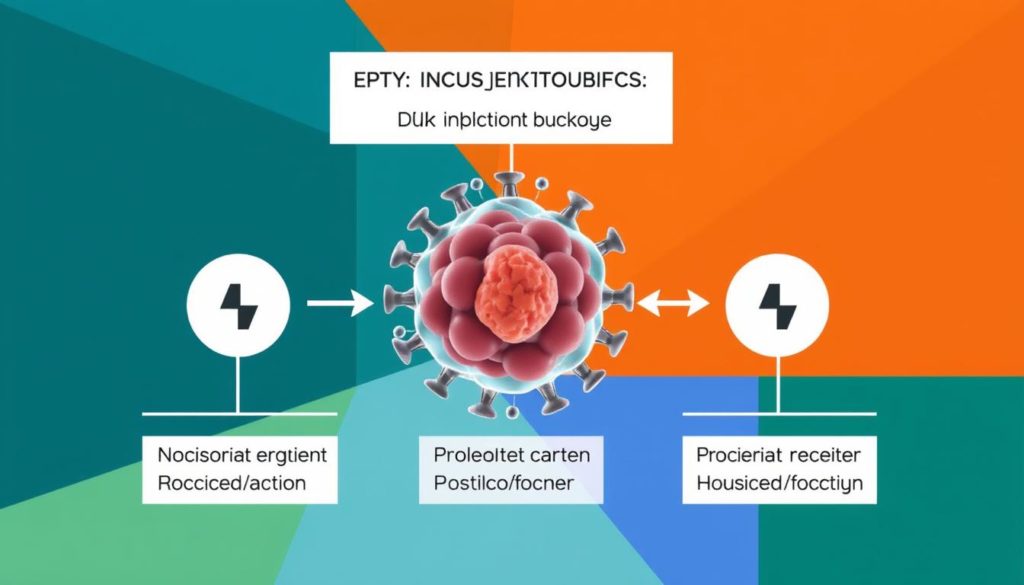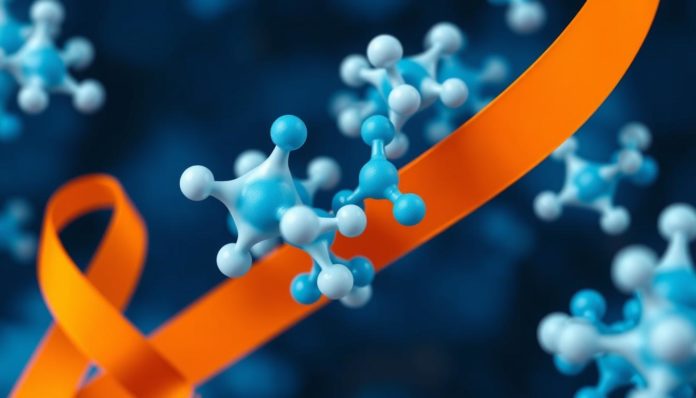About 85% of advanced prostate cancer patients respond well to hormone therapy. This method targets the testosterone that most prostate cancer cells need to grow. It works by reducing testosterone levels or blocking its effects, which is key in controlling cancer.
Hormone therapy for prostate cancer may include medications or surgery, like orchiectomy. This surgery removes the testicles and is permanent. It shows how vital careful choices and talking to doctors are.
Keeping an eye on PSA levels through regular tests is essential. It helps in watching for side effects and adjusting the treatment if needed. This careful watch ensures patients get the best treatment options available.
What is Hormone Therapy for Prostate Cancer?
Hormone therapy for prostate cancer aims to stop or block testosterone. This hormone can make prostate cancer grow. By interfering with testosterone, this therapy can slow down or shrink the tumors. There are several ways to target testosterone:

- The Role of LHRH Antagonists: Luteinizing Hormone-Releasing Hormone (LHRH) antagonists block the testicles from making testosterone.
- Medical Castration: This method reduces testosterone levels without surgery, using drugs instead.
- Androgen Synthesis Inhibitors: By focusing on specific enzymes, these drugs limit the production of androgens like testosterone.
- Androgen Receptor Blockers: These drugs prevent testosterone from reaching cancer cells by blocking its receptors.
- Antiandrogen Therapy: This approach involves drugs that stop testosterone’s effects. It’s often used with other hormone therapies.
Hormone therapy uses these strategies to control prostate cancer. The best approach can depend on cancer’s stage and the patient’s health. To understand how the therapies compare, look at the table below:
| Therapy Type | Mechanism | Primary Action |
|---|---|---|
| Androgen Receptor Blockers | Blocks androgen receptors | Prevents testosterone from binding to receptors on cancer cells |
| Androgen Synthesis Inhibitors | Inhibits enzyme activity | Hinders the production of androgens |
| LHRH Antagonists | Blocks pituitary signals | Stops testosterone production at the source |
| Medical Castration | Uses drugs to reduce testosterone | Mimics the effects of surgical castration |
| Antiandrogen Therapy | Block effect of testosterone | Often used in combination with other therapies |
Such a broad approach lets doctors create personalized treatments. It focuses on achieving the best results while minimizing side effects. Knowing about these therapies helps patients and families make educated decisions about treating prostate cancer.
Hormone Therapy Prostate Cancer Expectations
When looking into hormone therapy for prostate cancer, knowing what to expect is key. Various outcomes can happen with this treatment. Patients often ask about how successful it can be and the possible side effects.

Hormone therapy plays a crucial role in treating prostate cancer at different stages. It’s especially helpful for metastatic cancer to reduce tumors and slow down the disease. It’s also vital when PSA levels go up after initial treatment, pointing to cancer’s return.
When used together with external beam radiation, hormone therapy shows strong results for localized cancer. It makes cancer cells more vulnerable to radiation. Let’s go through what to expect during treatment:
- Initial Consultation: A detailed talk with your oncologist to grasp hormone therapy’s scope.
- Types of Hormone Therapy: Learning about the various kinds, including LHRH agonists, antagonists, and anti-androgens, along with their benefits and risks.
- Combination Treatments: Looking into the benefits of using hormone therapy with other treatments, such as radiation.
- Monitoring and Adjustments: Regular check-ups to keep an eye on PSA levels and tweak the treatment plan when necessary.
The effectiveness of hormone therapy differs based on cancer’s stage and the patient’s overall health. Intermittent therapy might lessen side effects and improve life quality. The best plan comes from deep talks with medical experts to customize your treatment.
“Hormone therapy has many aspects. Understanding your specific plan is crucial for the best results,” says Dr. Smith, a top oncologist.
In conclusion, having realistic expectations and a thorough conversation with your medical team can greatly influence the success of hormone therapy. It also boosts satisfaction with the treatment.
Types of Hormone Therapy
There are different ways to manage prostate cancer with hormone therapy. We’ll look at three key methods: LHRH agonists and antagonists, anti-androgens, and orchiectomy.
LHRH Agonists and Antagonists
LHRH drugs stop the testicles from making testosterone. They are given as shots or tiny implants under the skin. At first, LHRH agonists might increase testosterone, but then they lower it a lot.
Anti-androgens
Anti-androgen therapy stops testosterone from getting to cancer cells. It is often used with LHRH agonists for better results. These treatments are usually pills taken every day.
Orchiectomy
Orchiectomy is a surgery that removes the testicles to stop testosterone production. It’s an effective, but permanent, choice for some. While it works well, not everyone chooses this route because you can’t undo it.
When is Hormone Therapy Used?
Hormone therapy is key in treating prostate cancer, adjusted for the cancer stage and patient needs. It’s especially useful in certain situations.
Advanced Prostate Cancer
For advanced or metastatic prostate cancer, hormone therapy is a core treatment. It helps control the disease and improves life quality by reducing testosterone, which slows cancer growth. The treatment’s success relies on regular checks and adjustments.
Combination with Radiation Therapy
When hormone therapy is combined with radiation, the effects are stronger. This method, called adjuvant therapy, aims to lower the chance of cancer coming back by attacking the cells harder. Research shows this mix boosts survival rates and lessens disease impact.
After Surgery
Doctors often suggest hormone therapy after a prostatectomy to cut down the risk of cancer’s return. This is particularly advised for those at high risk. It attacks any cancer cells left, decreasing recurrence chances. Continuous care is crucial to keep the therapy effective and make necessary adjustments.
Potential Side Effects of Hormone Therapy
Hormone therapy helps in managing prostate cancer but often has side effects. One common issue is hot flashes, making many men uncomfortable. The treatment can also lead to more body fat and less muscle mass. This change affects one’s look and strength.
Sexual dysfunction is another problem, affecting intimate relationships.
Another serious effect of this therapy is bone thinning, which means a higher chance of fractures. It can also make you very tired, making daily tasks hard. There’s also a risk of diabetes and heart disease.
According to Prostate Cancer UK, you can handle these risks with lifestyle changes, medicine, and other treatments. This can make life better.
The following table highlights some of the major side effects seen in hormone therapy along with ways to manage them:
| Side Effect | Management Strategy |
|---|---|
| Hot Flashes | Cooling techniques, Medication |
| Increased Body Fat | Regular Exercise, Balanced Diet |
| Sexual Dysfunction | Counseling, Medication |
| Bone Thinning | Calcium and Vitamin D Supplements, Weight-bearing Exercises |
| Tiredness | Rest and Relaxation Techniques, Energy Conservation Strategies |
It’s important to talk about the health impacts of prostate cancer therapy with doctors. By talking about issues with hormonal treatments, you can manage them better.
Success Rate of Hormone Therapy for Prostate Cancer
Hormone therapy helps shrink tumors in prostate cancer. It’s key to slow down the disease. Every patient reacts differently, making it important to check each one’s response.
The PSA test is a way to know if hormone therapy is working. If PSA levels fall, the treatment is doing its job. But, this therapy might not cure the cancer. It can manage it and help people live better.
Treatment success depends on cancer’s stage and a person’s health. Hormone therapy can ease symptoms and slow cancer. This leads to better outcomes.
Clinical trials show hormone therapy works. But, doctors must watch how it’s going closely. They might need to change the treatment plan. Always talking to your healthcare provider will keep the therapy on track.
| Measure | Preferred Outcome | Observation |
|---|---|---|
| PSA Levels | Significant Decline | Indicates Response to Therapy |
| Tumor Size | Shrinkage | Slows Disease Progression |
| Quality of Life | Improvement | Enhanced through Symptom Management |
Hormone therapy’s success means less cancer signs, better symptoms, and managing the disease. This approach often gives good results for patients.
Managing Side Effects
It’s vital to reduce hormone therapy side effects to improve quality of life. There are several methods to effectively handle common side effects.
Hot Flashes
Hot flashes are often the most difficult part of hormone therapy. Doctors might suggest antidepressants or specific meds to cool them down. Adding yoga or acupuncture could help some people find relief too.
Bone Health
Keeping bones healthy is crucial during hormone treatment. This therapy may cause weak and brittle bones. Meds like bisphosphonates or denosumab can make bones stronger and prevent breaks.
Eating foods high in calcium and vitamin D is good. So is doing exercises that put weight on your bones. These steps help keep bones healthy while on hormone therapy.
Sexual Health
Hormone therapy can affect sexual well-being. Treatments for issues like erectile dysfunction, for example, PDE5 inhibitors such as Cialis or Viagra, may help. Talking to a counselor or therapist can aid in dealing with lowered sex drive and emotions too.
Talking openly with a healthcare provider is crucial. It helps find the best personal approach.
Recovery Time and Long-Term Management
Understanding the post-treatment recovery process is key for those who’ve had hormone therapy for prostate cancer. The recovery time varies by patient, depending on age, health, and treatment type. It’s critical to monitor for any signs of the cancer coming back.
Dealing with the long-term effects of hormone treatment is also crucial. Patients might experience hot flashes, more weight, and tiredness. These require continuous care. Staying active, eating well, and getting support for your mental health are important ways to lessen these effects.
Sustained hormone therapy management means regular talks with doctors to tweak the patient’s care plan. This can include changing medications, managing side effects, and doing regular health checks. A careful mix of medical and lifestyle changes improves life quality.
The main aim is to help patients with their post-treatment recovery and manage the long-term effects of hormone treatment well. By focusing on both the recovery now and their future health, patients can have a better, more complete care plan.
Future of Hormone Therapy in Prostate Cancer Treatment
Research in prostate cancer hormone therapy is making great strides. Scientists are hard at work looking into new hormone therapies. They aim to find ways that more accurately control androgen production. This could lead to better treatment options.
There’s also a focus on developing advanced receptor blockers. These blockers could improve treatment for hormone-resistant prostate cancer. They may lead to better results for patients.
Clinical trials are bringing forth exciting advancements in treatments. These new approaches aim to boost the power of current drugs while reducing bad side effects. By blending traditional and new compounds, these therapies offer a stronger fight against prostate cancer.
The main goal is to enhance the lives of those with prostate cancer. Research is paving the way for more refined and less disruptive treatments. With new drug formulations and ways to deliver them, the future looks promising for patient care. These advancements are expected to raise the bar for treatment outcomes.
FAQ
What is the purpose of hormone therapy for prostate cancer?
Hormone therapy fights prostate cancer by stopping or blocking testosterone. This hormone makes cancer cells grow. The goal is to shrink or slow down the cancer.
What are the common types of hormone therapy?
There are different ways to do hormone therapy. You can take medications like LHRH agonists and antagonists, or anti-androgens. Some might have surgery called orchiectomy to remove the testicles.
When is hormone therapy typically used in prostate cancer treatment?
It’s used at various times – for serious cancer, to make tumors smaller, after treatment if PSA levels go up, and with radiation therapy to make it work better.
What are some potential side effects of hormone therapy?
Side effects can change your body and health. You might lose muscle, gain fat, have sexual issues, or get thin bones. You might also feel hot flashes, tiredness, and have a higher risk of diabetes and heart disease.
How effective is hormone therapy for prostate cancer?
Hormone therapy usually works well in slowing cancer growth or shrinking it, especially in late stages. Checking PSA levels and keeping up with doctor visits is key to watch your progress and adjust treatment if needed.
What are LHRH agonists and antagonists?
LHRH drugs stop your testicles from making testosterone. You can get them through shots or small things placed under your skin.
What is anti-androgen therapy?
Anti-androgen therapy stops testosterone from reaching cancer cells. It’s often used with LHRH drugs to make treatment work better.
What is an orchiectomy, and is it commonly used?
Orchiectomy is a surgery to remove the testicles. It greatly lowers testosterone quickly. Though not as common as medication, it’s a simpler, one-time procedure.
How can I manage the side effects of hormone therapy?
To handle side effects, you might take pills for hot flashes or protect your bones against thinning. There are also ways to treat sexual problems like erectile dysfunction.
What is the long-term recovery process like after hormone therapy?
Recovery depends on each person. Watching for cancer signs and dealing with side effects is crucial. Regular doctor visits are part of the journey.
What are the future prospects for hormone therapy in prostate cancer treatment?
Researchers are always looking for better treatments. They want to find ways that are more effective, have fewer side effects, and tackle resistant cancer cells.
Why is regular follow-up necessary during hormone therapy?
Regular check-ups are vital. They help watch for side effects and see if the cancer changes. This way, treatments can be adjusted for the best results.


